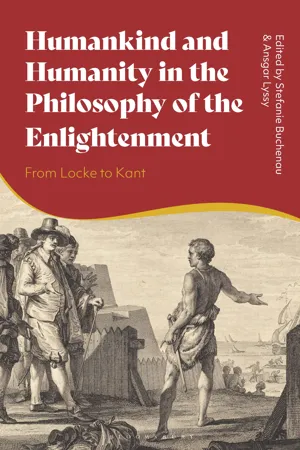
eBook - ePub
Humankind and Humanity in the Philosophy of the Enlightenment
From Locke to Kant
- 280 pages
- English
- ePUB (mobile friendly)
- Available on iOS & Android
eBook - ePub
Humankind and Humanity in the Philosophy of the Enlightenment
From Locke to Kant
About this book
What makes us human beings? Is it merely some corporeal aspect, or rather some specific mental capacity, language, or some form of moral agency or social life? Is there a gendered bias within the concept of humanity? How do human beings become more human, and can we somehow cease to be human? This volume provides some answers to these fundamental questions and more by charting the increased preoccupation of the European Enlightenment with the concepts of humankind and humanity.
Chapters investigate the philosophical concerns of major figures across Western Europe, including Montesquieu, Diderot, Rousseau, Locke, Hume, Ferguson, Kant, Herder, Johann Friedrich Blumenbach and the Comte de Buffon. As these philosophers develop important descriptive and comparative approaches to the human species and moral and social ideals of humanity, they present a view of the Enlightenment project as a particular kind of humanism that is different from its Ancient and Renaissance predecessors.
With contributions from a team of internationally recognized scholars, including Stephen Gaukroger, Michael Forster, Céline Spector, Jacqueline Taylor, and Günter Zöller, this book offers a novel interpretation of the Enlightenment that is both clear in focus and impressive in scope.
Chapters investigate the philosophical concerns of major figures across Western Europe, including Montesquieu, Diderot, Rousseau, Locke, Hume, Ferguson, Kant, Herder, Johann Friedrich Blumenbach and the Comte de Buffon. As these philosophers develop important descriptive and comparative approaches to the human species and moral and social ideals of humanity, they present a view of the Enlightenment project as a particular kind of humanism that is different from its Ancient and Renaissance predecessors.
With contributions from a team of internationally recognized scholars, including Stephen Gaukroger, Michael Forster, Céline Spector, Jacqueline Taylor, and Günter Zöller, this book offers a novel interpretation of the Enlightenment that is both clear in focus and impressive in scope.
Frequently asked questions
Yes, you can cancel anytime from the Subscription tab in your account settings on the Perlego website. Your subscription will stay active until the end of your current billing period. Learn how to cancel your subscription.
No, books cannot be downloaded as external files, such as PDFs, for use outside of Perlego. However, you can download books within the Perlego app for offline reading on mobile or tablet. Learn more here.
Perlego offers two plans: Essential and Complete
- Essential is ideal for learners and professionals who enjoy exploring a wide range of subjects. Access the Essential Library with 800,000+ trusted titles and best-sellers across business, personal growth, and the humanities. Includes unlimited reading time and Standard Read Aloud voice.
- Complete: Perfect for advanced learners and researchers needing full, unrestricted access. Unlock 1.4M+ books across hundreds of subjects, including academic and specialized titles. The Complete Plan also includes advanced features like Premium Read Aloud and Research Assistant.
We are an online textbook subscription service, where you can get access to an entire online library for less than the price of a single book per month. With over 1 million books across 1000+ topics, we’ve got you covered! Learn more here.
Look out for the read-aloud symbol on your next book to see if you can listen to it. The read-aloud tool reads text aloud for you, highlighting the text as it is being read. You can pause it, speed it up and slow it down. Learn more here.
Yes! You can use the Perlego app on both iOS or Android devices to read anytime, anywhere — even offline. Perfect for commutes or when you’re on the go.
Please note we cannot support devices running on iOS 13 and Android 7 or earlier. Learn more about using the app.
Please note we cannot support devices running on iOS 13 and Android 7 or earlier. Learn more about using the app.
Yes, you can access Humankind and Humanity in the Philosophy of the Enlightenment by Stefanie Buchenau, Ansgar Lyssy, Stefanie Buchenau,Ansgar Lyssy in PDF and/or ePUB format, as well as other popular books in Philosophy & Ethics & Moral Philosophy. We have over one million books available in our catalogue for you to explore.
Information
Table of contents
- Cover
- Halftitle Page
- Title Page
- Contents
- Notes on contributors
- Introduction Stefanie Buchenau and Ansgar Lyssy
- 1 The presumptive unity of humankind in Locke’s Essay Philippe Hamou
- 2 Human nature in Montesquieu Céline Spector
- 3 The image of the human being in the Comte de Buffon Catherine Wilson
- 4 Hume on humanity and the party of humankind Jacqueline Taylor
- 5 Humankind and humanity in Diderot Ansgar Lyssy
- 6 How do humans become human(e)? On Rousseau’s Second Discourse and Emile Gabrielle Radica
- 7 ‘In the human kind, the species has a progress as well as the individual’: Adam Ferguson on the progress of ‘mankind’ Eveline Hauck and Norbert Waszek
- 8 The association of science and civilization in the Enlightenment Stephen Gaukroger
- 9 Philoctetes at the edge of humanity: The German Enlightenment debate on social exclusion and the education of feeling Stefanie Buchenau
- 10 Enlightenment moral philosophy and moral psychology: Baumgarten, Kant and Herder on moral feeling(s) and obligation Nigel DeSouza
- 11 Herder on humanity Michael N. Forster
- 12 Blumenbach on the varieties of the human species François Duchesneau
- 13 Can Kant’s man be a woman? Charlotte Morel
- 14 ‘Anthroponomy’. Kant on the natural and the rational human being Günter Zöller
- Index
- Imprint